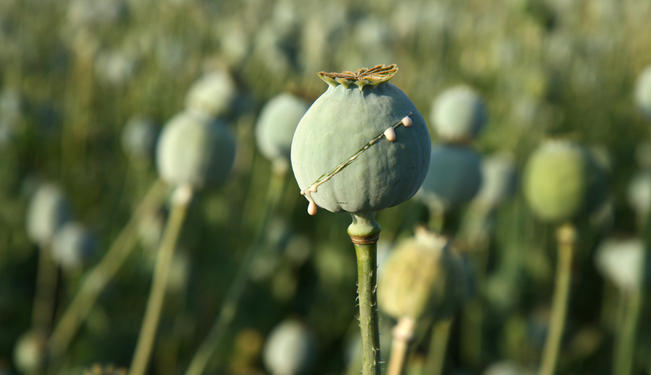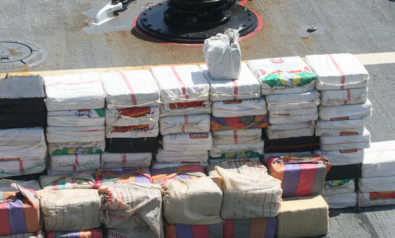With a death toll paring that of low intensity warfare, and with one of the highest rates of drug addiction in the world, Iran stands on the frontline of the War on Drugs. Yet, Human Rights Watch and other international groups are calling for the freezing of funding to Iran’s drug control programs. In recent years, the global War on Drugs has been given increasing importance. A re-evaluation of the international response to the drug problem is underway. It is not within the scope of this short piece to deal with the generalities of the War on Drugs, but rather with its regional, local shortcomings, which can in brief be defined as the side effects of a historically long-lasting policy of militarization. Iran on the Frontline Iran, somehow more than Mexico, stands on the frontline of this war, and more than any other country in the world has fought it with military and law enforcement strategies. The price has been incredibly high both in human terms, with a death toll paring that of low-intensity warfare; and in social terms. In a recent commentary by online media and international newspapers, Advocacy Director of the Health and Human Rights Division at Human Rights Watch (HRW) Rebecca Schleifer, along with Harm Reduction International (HRI), accused international donors of providing financial resources for the Islamic Republic of Iran, a regime which violates human rights and judicial procedures against drug offenders. Previously, an article by Chris DeVito had criticized the United Nations Office on Drugs and Crime's (UNODC) cooperation with the Iranian government, for “providing the Iranian regime with resources that help it continue its brutal assault on its own citizenry”. On September 15, The Guardian published an article which wondered whether UK support for Iran’s counter-narcotics programmes “has led to more executions”. When one looks at the statistics on death penalties, the Iranian state ranks second after China and first on a per capita basis; 80% of executions are because of drug-related offences, according to the Head of the High Council for Human Rights, Mohammad Javad Larijani. Nonetheless, a more in-depth perspective reveals quite a different reality, confuting the calls for freezing donations. Human Rights Watch First, HRW’s criticism fails to recognize the important developments achieved by Iranian authorities in the field of drug policies, especially when compared to its regional neighbors. Even compared to Western countries, Iran seems to have a complex system of prevention, treatment, and enforcement response with regard to narcotic drugs. These have been the result of decades-long improvements at the policy-making, societal, and ideological levels, and have contributed to a remarkable change in the state’s approach vis-à-vis drug consumers and addicts. While HRW’s article emphasizes the Law Enforcement Agencies’ response to drug traffickers and consumers, the reality shows a much more pragmatic approach by Iranian policy-makers, who have initiated a number of programmes aimed at helping the more vulnerable elements of society, such as HIV-positive prisoners and female addicts. The death penalty for drug offences is reserved for cases concerning large quantities of drugs, particularly in the case of opiates (opium, morphine, heroin), and is usually inflicted after the offender has been found guilty the third time. For cases involving larger amounts of the drugs, or production/distribution of meth-amphetamine, the judge might opt for the death penalty at the first time itself. Second, but less important, apart from singling out one aspect of a broader drug reality in Iran, the HRW report seems nonchalant about the cases of other regional countries, where the death penalty is applied for minor drug offences and even for misdemeanours like repeated drug use. For instance, Saudi Arabia beheads drug traffickers, regardless of whether they are foreign nationals not benefiting from consular assistance before their trial, as reported by Amnesty International on the case of ten Iranian nationals. It is true that Saudi Arabia had only 76 executions in 2011, compared to Iran’s 600. Yet, one must take into consideration the greater amount of trafficking occurring on Iran’s 1,923km long porous eastern border with Afghanistan and Pakistan. In 2008, “Iran accounted for the highest rate of opium seizures (89% [of the total]) in the world, as well as heroin/morphine (41%)” according to the UNODC World Drug Report 2011. Third, the article by HRW fails to look into the other aspects of the Iranian drug response, namely the treatment of the vast number of drug addicts through a variety of public, private, and NGO services. Over the years, Iranian authorities have developed, despite a fear of backlash, a multi-faceted and pragmatic approach towards addiction, emphasizing treatment-oriented policies over security-oriented policies. Freezing donor funds for these projects, which often see the participation of international organizations (such as the UNODC) would mean stepping backward in the creation of a vast, expert, and efficient drug treatment and prevention programme. It would put ideals before practices and, quite surely, it will not pressure the government significantly enough to change its policies of capital punishment for smugglers. A New Approach International conventions of human rights do not contemplate the death penalty for drug offences. To understand why Iranian authorities apply it, one must look at the ‘security prism’ through which drug trafficking is seen in Tehran. Iranian policy-makers have thus followed a pattern not dissimilar from that of the War on Drugs in other regions of the world. One might argue, and I do so, that the militarization of this conflict has produced more serious effects than the problem itself, and that the time is ripe for a new formulation of the international response to the drug trade. Iran should change its internal rules and should put smugglers on trial in civil (and not revolutionary) courts and guarantee a transparent proceeding. The means to achieve this goal is to deepen and widen contacts with the Iranian establishment, rather than cutting the few remaining ties. Also, the timing of the HRW’s article appears to be badly managed; even though human rights violations are an absolute priority, the strategy to achieve them must confront a stark environment of international isolation and crisis, for which calls for change in Law Enforcement Agencies' response to smuggling are hardly enough to produce any change through unilateral pressures. Since smuggling takes place in border areas with the vast participation of ethno-tribal networks straddling the IranAf/Pak border, it is perceived as a major national security threat. The involvement of international terrorist groups and separatist movements, such as Jundullah, somehow supported by Iran’s antagonists (the US and Israel), transform the issue of narcotics into a key piece of a broader geopolitical game. All of this has acquired increasing relevance in the post-2001 NATO invasion, when Afghan opium production skyrocketed, with obvious benefits for armed organizations fighting in Iran’s south-east region of Sistan & Baluchistan. Finally, the European Union and other international actors have a socio-political commitment to enhance Iran’s capability to curtail the flow of drugs. Without Iran’s cooperation, the amount of narcotics flowing to Europe and other parts of world would be immensely larger than what it is at present. At the moment, because of pressure applied by the US, international funds for Iran’s anti-narcotic programmes pale in comparison to those of Afghanistan and Pakistan, despite two major realities. One is Tehran’s ability over the last decade to produce more concrete results in terms of seizure and supply reduction than its eastern counterparts; the second is the human and social capital which Iranians are paying for the War on Drugs, a reality affecting law enforcement agencies, young people, and families. Can Iran be simply labelled as brutal and repressive, or should a more complex picture be drawn? Denying Iran’s role in the international anti-drug response because of Iran’s “persistent violations”, would be equal to taking an un-pragmatic stance over a critical issue of international concern, and would close one of the few windows of cooperation with the Islamic Republic. It would make the world order lean towards a path of confrontation rather than of negotiation, with little hope for short-term improvements in the Iranian conundrum. The views expressed in this article are the author's own and do not necessarily reflect Fair Observer’s editorial policy. The image used in this article is the property of Shutterstock. All rights reserved.
Support Fair Observer
We rely on your support for our independence, diversity and quality.
For more than 10 years, Fair Observer has been free, fair and independent. No billionaire owns us, no advertisers control us. We are a reader-supported nonprofit. Unlike many other publications, we keep our content free for readers regardless of where they live or whether they can afford to pay. We have no paywalls and no ads.
In the post-truth era of fake news, echo chambers and filter bubbles, we publish a plurality of perspectives from around the world. Anyone can publish with us, but everyone goes through a rigorous editorial process. So, you get fact-checked, well-reasoned content instead of noise.
We publish 2,500+ voices from 90+ countries. We also conduct education and training programs
on subjects ranging from digital media and journalism to writing and critical thinking. This
doesn’t come cheap. Servers, editors, trainers and web developers cost
money.
Please consider supporting us on a regular basis as a recurring donor or a
sustaining member.
Will you support FO’s journalism?
We rely on your support for our independence, diversity and quality.







Comment